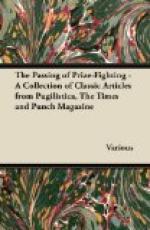Tuesday, February 24th.—In both Houses the new policy of the Allies in regard to Soviet Russia was unfolded. The gist of it is that they will not enter into diplomatic relations with the Bolshevist Government until it is ready to adopt civilised methods, but in the meantime will heartily encourage trade with Russia. It would seem that the practical genius of our race has once more discovered a means of indulging sentiment without interfering with business.
[Illustration: THE LABOUR LORD CHANCELLOR.
A forecast.
LORD HALDANE.]
Lord BIRKENHEAD (not BROKENHEAD, by the way, as the Cork Constitution, inadvertently or not, calls him) chaffed LORD HALDANE on his “How Happy could I be with Either” attitude between Liberalism and Labour, and advised him definitely to be off with the old love and on with the new, in order that when Labour came into its own the Woolsack might be adequately filled.
Sir ALFRED MOND did not allow himself to be perturbed by the description of certain pictures in the Imperial War Museum as “freaks” and “libels,” for he had observed “with some astonishment” that most of the art critics had pronounced them to be very fine works of art. But when Mr. JEREMIAH MACVEAGH asked if some of these pictures were not portraits of Cabinet Ministers, “and if so how can they possibly be works of art?” the First Commissioner’s artistic conscience was stirred, and compelled him to give the questioner a little instruction in first principles. “Whether a portrait is a work of art depends,” he pointed out, “on the artist and not on the subject painted.”
The evening was devoted to drink. Sir JOHN REES, who urged the abolition of all wartime restrictions, would have been more effective, perhaps, if he had not striven so hard to be lively. One of his sallies, evoked by the impending debut of Lady ASTOR as a Parliamentary orator, was indeed, as she observed, “more than polite.”
She herself had her moments of gaiety, but was best, I thought, when seriously arguing for the continuance of the restrictions on alcohol in the special interests of women.
I am afraid, however, that the unregenerate were more intrigued by Mr. CARR’S claim that the Carlisle experiment had been a great success—“it was the only city in the country in which a man could buy a bottle of whisky to take home.”
Wednesday, February 25th.—Question-time in the Commons was dominated by the news that Mr. ASQUITH was in for Paisley, and Members were more concerned in discussing the effect of his return upon the Government and Opposition than in listening to Ministerial replies. Sir DONALD MACLEAN was “all smiles” over his approaching release from the responsibilities of leadership; but Mr. HOGGE, I thought, looked rather like Mrs. Gummidge when “thinking of the old ’un.”
A nod from Mr. MACPHERSON and the Government of Ireland Bill was formally and silently introduced—strange contrast to the long debates and exciting scenes that attended the birth of the Bill’s three predecessors in 1886, 1893 and 1912.




